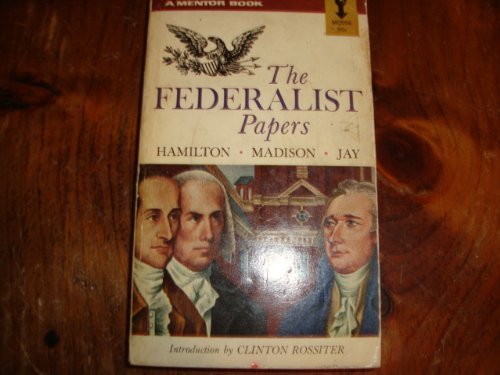Items related to The Federalist Papers

Synopsis
The Federalist Papers are a series of 85 articles advocating the ratification of the US Constitution. 77 of the essays were published serially in The Independent Journal & The NY Packet between 10/1787 & 8/1788. A compilation of these & 8 others, called The Federalist, was published in 1788 by J.&A. McLean.
The Federalist Papers serve as a primary source for interpretation of the Constitution, as they outline the philosophy & motivation of the proposed system of government.The authors wanted both to influence the vote in favor of ratification & to shape future interpretations of the Constitution. According to historian Richard B. Morris, they are an "incomparable exposition of the Constitution, a classic in political science unsurpassed in both breadth & depth by the product of any later American writer."
The articles were written by:
Alexander Hamilton (1,6–9,11–13,15–17,21–36,59–61,65–85)
James Madison (10,14,18–20,37–58,62–63)
John Jay (2–5,64)
They appeared under the pseudonym "Publius," in honor of Roman consul Publius Valerius Publicola. Madison is generally credited as the father of the Constitution & became 4th President of the United States. Hamilton was an active delegate at the Constitutional Convention & became 1st Secretary of the Treasury. John Jay became 1st Chief Justice of the United States.
"synopsis" may belong to another edition of this title.
Review
"This country and this people seem to have been made for each other, and it appears as if it was the design of Providence, that an inheritance so proper and convenient for a band of brethren ... should never be split into a number of unsocial, jealous, and alien sovereignties." So wrote John Jay, one of the revolutionary authors of The Federalist Papers, arguing that if the United States was truly to be a single nation, its leaders would have to agree on universally binding rules of governance--in short, a constitution. In a brilliant set of essays, Jay and his colleagues Alexander Hamilton and James Madison explored in minute detail the implications of establishing a kind of rule that would engage as many citizens as possible and that would include a system of checks and balances. Their arguments proved successful in the end, and The Federalist Papers stand as key documents in the founding of the United States.
About the Author
Review The Federalist Papers are a series of 85 articles advocating the ratification of the United States Constitution. Seventy-seven of the essays were published serially in The Independent Journal and The New York Packet between October 1787 and August 1788. A compilation of these and eight others, called The Federalist; or, The New Constitution, was published in two volumes in 1788 by J. and A. McLean. The series' correct title is The Federalist; the title The Federalist Papers did not emerge until the twentieth century. The Federalist remains a primary source for interpretation of the U.S. Constitution. According to historian Richard B. Morris, they are an "incomparable exposition of the Constitution, a classic in political science unsurpassed in both breadth and depth by the product of any later American writer." At the time of publication, the authorship of the articles was a closely-guarded secret, though astute observers guessed that Hamilton, Madison, and Jay were the likely authors. Following Hamilton's death in 1804, a list that he drew up became public; it claimed fully two-thirds of the essays for Hamilton, including some that seemed more likely the work of Madison (Nos. 49-58, 62, and 63). The scholarly detective work of Douglass Adair in 1944 postulated the following assignments of authorship, confirmed in 1964 by a computer analysis of the text: - Alexander Hamilton (51 articles: nos. 1, 6-9, 11-13, 15-17, 21-36, 59-61, and 65-85) - James Madison (29 articles: nos. 10, 14, 37-58 and 62-63) - John Jay (5 articles: 2-5 and 64). - Nos. 18-20 were the result of a collaboration between Madison and Hamilton.
"About this title" may belong to another edition of this title.
(No Available Copies)
Search Books: Create a WantCan't find the book you're looking for? We'll keep searching for you. If one of our booksellers adds it to AbeBooks, we'll let you know!
Create a Want
